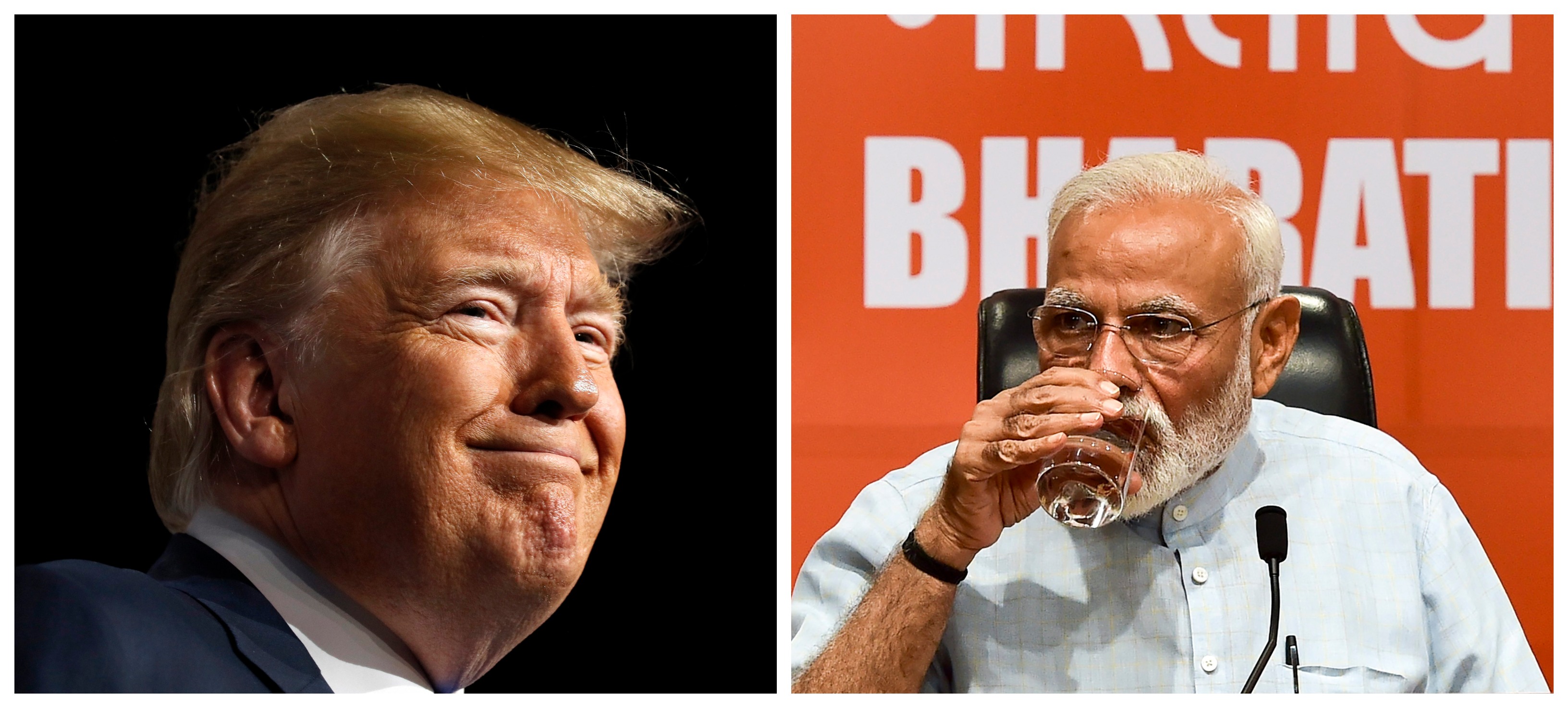
Uncle Sam dictates terms of endearment to India

United States president Donald Trump is proving to Indians it is not easy to be in a relationship with his country. The latest round of trade talks between senior officials of the two countries have ended, expectedly, with no result. The tug-of-war, meanwhile, continues.
The issue is, on paper, fairly simple. The US wants India to reduce, if not remove, tariffs on goods imported from there in exchange for Washington’s bear hug of friendship that it promises will safeguard New Delhi’s security interests vis-a-vis China and Pakistan.
Not just that. The US promises to push India up the military ladder, use its services to scour the Indian Ocean, Pacific and be Washington’s eyes and ears in the south-east and far east Asian region that in the coming decades promise to be a hotbed of rivalry between China on the one side and US allies Japan, South Korea and the Philippines on the other.
Also Read: G-20 eclipsed by Trump’s spat with China, India
The Trump administration, as a measure of its goodwill, has already renamed its largest military command, the Pacific Command, as the US Indo-Pacific Command. And, more recently, the US senate cleared India as a NATO-like ally, which brings the two nations closer than ever before.
There have been other lollipops, like helping to influence the United Nations Security Council and particularly China to declare Pakistan-based Kashmiri separatist group Jaish-e-Muhammad chief Masood Azhar as a global terrorist. This was a long-pending Indian demand which Washington managed to fulfill using its “long arm”. There is, as the saying goes, no free lunch. And, the Trump administration is ensuring that not only does India pay for the lunch but pays that with interest.
Already, the Modi government has succumbed to US pressure not to buy oil from Iran. The US is now demanding that India not allow the Chinese technology giant Huawei to bid for 5G trial runs in the country. And, unsurprisingly, New Delhi has already indicated that Huawei may be blocked from the 5G trials. This despite the fact that reports point out to the many advantages that will accrue to India if it goes with Huawei.
Also Read: At G20, Donald Trump shows Uncle Sam is nobody’s friend
In fact, the US is believed to be working on a proposal to make India sign a free trade agreement with Washington. If that happens, India will certainly find itself even more tightly stuck in the seductive embrace of the United States. Indian Foreign Minister S Jaishankar, at an interaction with officials in the ministry, said, “Trump is clearly preparing for a larger game, a larger opening,” according to the news agency Reuters quoting an official at the meeting.
The irony is that Indian officials, especially the experienced ones, having schooled in international diplomacy from the time of the Cold War, are aware of the dangers of sleeping with the US, but are clueless how to maintain a distance and yet remain friends. For, a free trade agreement is most likely to compromise India’s economic independence, make it overly reliant on the US and squash the ‘swadeshi’ lobby that dreams of turning the country into a major manufacturing hub a la China.
The Trump administration continuing demand that India ease tariffs and non-tariff barriers may also be a reaction to complaints from top US corporates like Amazon and Walmart, which resent a few recent decisions of the Modi government. In February, India prohibited big online companies from giving steep discounts as that was hurting small traders, politically the backbone of the BJP’s support base.
This shocked Amazon and Walmart, especially the latter which had just a few months earlier invested $16 billion in acquiring Indian e-commerce company Flipkart. A Walmart complaint to the Trump administration detailing its resentment has since been publicly revealed and discussed.
Also Read: US pressures China on ban of JeM chief Masood Azhar
New Delhi is also insisting on data localisation, which the e-commerce giants have virtually ruled out. The Modi government, in its draft e-commerce policy, has proposed that data generated in India must be made accessible to New Delhi and remain within the country. To this, e-commerce companies say that complying with that is unviable and data is invaluable for the companies and cannot be shared.
The final word on the issue has not been heard but before New Delhi finalises any rules on the issue, the US corporates are reportedly pressing the Trump administration to intervene and prevent that from being implemented.
The US government has tried all ways to make the Modi dispensation bend to its will. It is in this context that one must see Trump’s announcement at the recent G20 meet at Osaka that “a big deal was waiting to happen with India”. In other words, the promise of a sweetener if the Indian government cooperates with Washington.
Meanwhile, in typical Washington-speak, the Trump administration carried out its threat of removing India from the list of Generalised System of Preferences which had enabled New Delhi to export a number of items with zero tariff into the US. In retaliation to Trump’s move, India increased export tariffs on 28 US goods. Trump has reportedly asked the Modi administration to roll back the retaliatory tariffs.
These issues, among others, are as yet unresolved and the talks that were held last week revolved around hammering a deal. But nothing has come of it. The talks apparently prepared the ground for the next round of discussions when Indian Commerce and Industry Minister Piyush Goyal goes to Washington in August.
The spectre of discussions and negotiations may give the impression that India is on equal footing with the United States. But, in reality, that is far from the truth. Eventually, if decisions on Iran and Huawei are any indication, the Indian government will be forced to agree to a compromise even while appearing to stand its ground.

